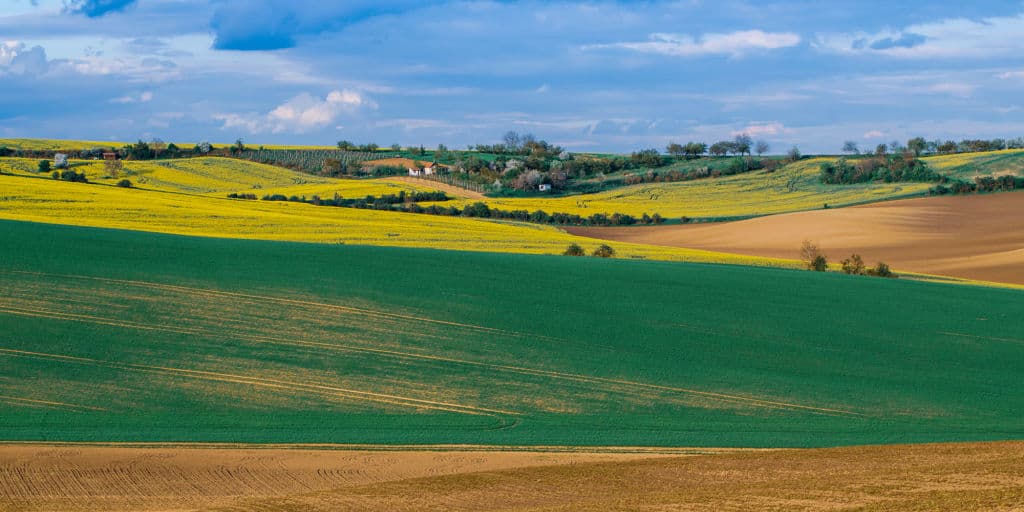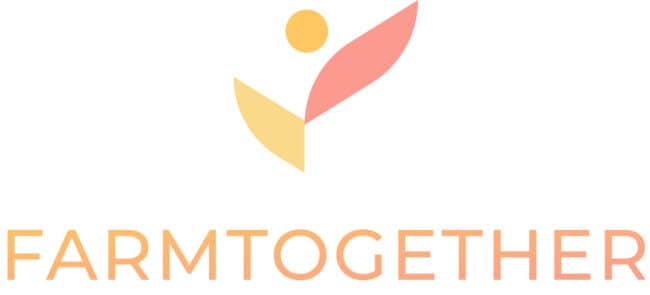Real Estate Investing with Crowdfunded Farmland
(This page may contain affiliate links and we may earn fees from qualifying purchases at no additional cost to you. See our Disclosure for more info.)
Investing is an integral part of building your financial house. While saving an emergency fund and budgeting is crucial to staying out of debt, you won't build wealth (and outpace inflation) without investing.
Compounding works its magic by growing your net worth the earlier and more often you invest!
You may be familiar with investment vehicles such as a 401(k) or an IRA and hold common investment assets such as stocks, mutual funds, and bonds.
Some investors also diversify their portfolios by adding alternative investments, including fine art, cryptocurrencies, antiques, or precious metals.
Buying income-producing residential or commercial real estate is another popular investment option. And a Real Estate Investment Trust or REIT allows you to purchase small “slices” of real assets without needing to buy your own rental property.
One real estate alternative investment option you may not know much about or realize you can invest in is farmland.

Many forms of real estate investing require an active approach, including touring properties, extensive due diligence, making property improvements, and dealing with tenants and property managers.
On the other hand, crowdfunded farmland investment platforms provide a mostly passive way to access this asset class.
This article will explain more about why people choose to invest in alternative assets such as farmland, the benefits and drawbacks of investing in farms and cash crops, who should consider a crowdfunded agriculture investment, and how to get started investing in farmland.
*This article is sponsored by FarmTogether. If you’re looking for a hedge against inflation with low volatility and strong returns, check out how crowdfunding works at FarmTogether! Some of their recent deals include an organic citrus farm, corn farm, and apple, hazelnut, pistachio, and walnut orchards.
Benefits of Farmland Crowdfund Investments
You may have heard the mantra “don't invest in what you don't understand” enough times to believe it.
Yet just as you spent time learning about investing in the stock market, it's essential to put some effort into understanding diverse asset classes and how they can help grow your wealth.
There's a chance you already indirectly invest in agriculture-related mutual funds or purchase individual stocks in companies that operate farms or businesses supporting farming. Still, there are more direct ways to invest in farmlands too.
Investing in crowdfunded farmland is a unique form of real estate investing. It has become more available and attractive to individual investors over the last few years.
Here are six reasons to consider when adding this alternate investment to help recession-proof your portfolio.
1. There’s an increasing demand for food in the world and a limited supply of fertile farmland to produce crops and use as grazing land for animals.
A United Nation's resource claims that the world’s population continues to grow and is expected to increase by 2 billion persons over the next two decades.
And deforestation, climate change, and soil degradation have led to billions of acres of unfarmable land. This means that the land that is suitable for farming will only increase in value.
2. Farmlands have produced stable growth over decades without the volatility of the stock market or alternative investments like cryptocurrency.
According to FarmTogether, the NCREIF farmland index hasn’t had a negative year in nearly 30 years, and strong absolute returns have averaged ~10.85% total annual returns (income + price appreciation) since 1992.
Farmland investments lack correlation with other asset classes, which provides a hedge against inflation and reduces investor risk during adverse market conditions.
3. When you invest in agriculture, you have the potential for multiple streams of revenue.
In addition to lease payments from farmers and the share of crop yields, the value of farmland may appreciate over the hold period of the investment. You may reap the benefits of that appreciation when the farm is sold.
4. When you participate in a crowdfunding farmland investment to make money, it's primarily a passive investment that doesn't require extensive knowledge of the specific asset class or effort on your part.
FarmTogether, whose management team has a combined 100 years of experience across investing and agriculture, partners with industry and agricultural management experts to perform the due diligence and deep underwriting required to successfully land profitable deals for investors.
5. While you may decide to invest in Real Estate Investment Trusts (REITs) as a tool for diversification, investing in farmland through crowdfunding gives you greater control over the type of alternative assets, i.e., types of crops and the farm locations, you desire to invest in.
Also, unlike REITs, direct investments into farmland are not tied to the stock market.
6. If you invest with FarmTogether, you'll be a part of driving agriculture toward sustainability on a massive scale.
100% of FarmTogether acreage is enrolled in the Leading Harvest Sustainability Standard, the non-profit innovator of sustainable agriculture management.
Leading Harvest has a standard based on 13 fundamental sustainability principles, including soil health and conservation, protection of water resources and special sites, along with preservation of biodiversity, and more.

Drawbacks of investing in crowdfunded agricultural land
As with your other investments, there are risks and disadvantages to consider when deciding whether to invest in agricultural assets. Here are a few cons to consider:
1. Crowdfunded farmland investments generally have a long-term investment horizon and are mostly illiquid at this time.
A holding period is typically five years or longer, but FarmTogether offers annual liquidity windows for earlier exits.
2. At this point, you need to be an accredited investor to take advantage of investment offerings at FarmTogether. This means that you must meet the SEC's Accredited Investor definitions.
While some accredited investors won't be concerned with minimum investment requirements, those just getting started with alternative investing may balk at five-figure offerings. With FarmTogether, however, minimum investments begin at $15,000.
3. When it comes to farmlands, “Mother Nature” can wreak havoc on annual income.
Weather patterns that bring flooding rains can wash away profits, and a lack of rain can cause similar damage.
Extreme cold or hot temperatures, insect invasions, disease, and wildfires are risks farm and crop investors need to consider. Legislative changes are another variable that can influence the rate of returns.
While there are risks that are out of FarmTogether’s control, the team performs thorough due diligence to identify potential issues, such as water availability, before offering the deal to its investors.
Why Invest with FarmTogether?
FarmTogether provides accredited investors who are seeking alternative investments an option to participate in crowdfunding sustainable farmland.
They offer hassle-free administration services and allow various investment methods such as individual entities, self-directed IRAs, Solo 401ks, and more.
You can track the return on investment and access any information you need on FarmTogether's secure, self-service platform. Ongoing income returns are automatically deposited in your bank account.
Additionally, at the end of your investment's hold period, you'll receive returns from farmland via price appreciation.
The team of seasoned veterans at FarmTogether targets investment opportunities offering 7 – 13% returns with 3 – 9% cash yields – net of all fees.
Read more about FarmTogether's investment process and philosophy.
The online service platform and use of technology to find and acquire farmland offerings allow FarmTogether to provide individual investors with lower fees than the industry average in many cases.
Costs vary and are listed on each investment opportunity's page.
FarmTogether is also researching ways to open up investment offerings to non-accredited users. You can contact FarmTogether directly for more information.
Bespoke offerings are available for investors who seek sole ownership, starting at $1,000,000+ in equity per farm.
Final Thoughts on Crowdfunded Farmland Investments
If you're interested in exposing a small part of your net worth to a unique real estate investment opportunity with an attractive return, you might consider farmland crowdfunding.
Farmland is a solid alternative investment option because it’s resilient in challenging times and boasts decades of stable performance.
Trusted by institutional investors, farmland investing is considered high yielding in terms of the risk-return basis.
FarmTogether's commitment to funding sustainable and prosperous farms means your investment dollars are also working to ensure food security for a growing population.
It's a win-win for your wealth and the health of our planet.
If you want to learn more about agricultural investing, spend a few minutes on FarmTogether's Learning Center and find blog posts, white papers, infographics, webinars, and podcasts to help answer your questions.
You'll learn more about what makes farmlands an attractive alternative asset class some savvy investors add to their investment portfolios.

Written by Women Who Money Cofounders Vicki Cook and Amy Blacklock.
Amy and Vicki are the coauthors of Estate Planning 101, From Avoiding Probate and Assessing Assets to Establishing Directives and Understanding Taxes, Your Essential Primer to Estate Planning, from Adams Media.

